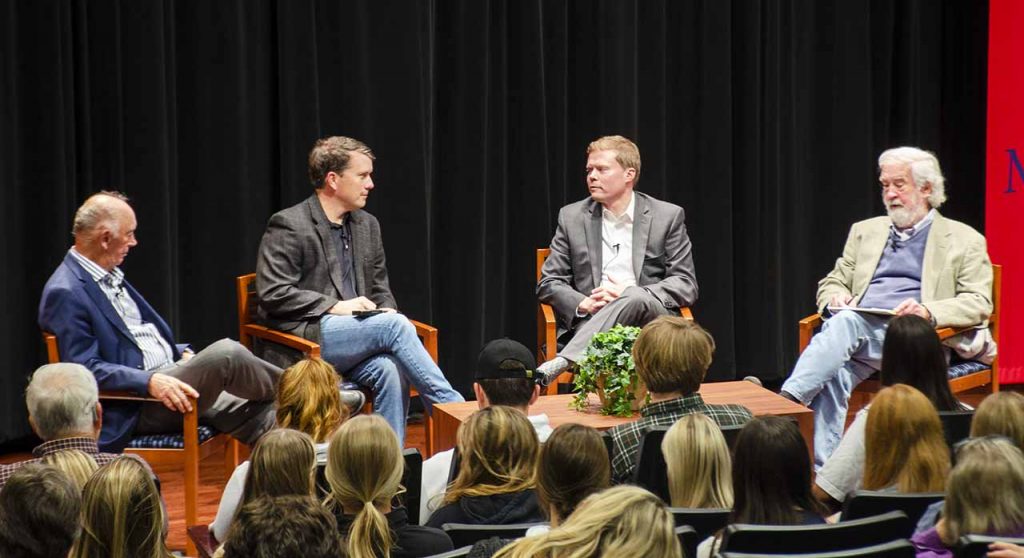
Political consultants Austin Barbour and Brandon Jones speculated on the upcoming Mississippi gubernatorial election and made their cases for each candidate at the Overby Center on Wednesday night.
Barbour, a Republican Ole Miss alumnus and nephew of former governor Haley Barbour, supports Republican Lt. Gov. Tate Reeves. Jones, a Democrat and former member of the state House of Representatives, prefers Democratic Attorney General Jim Hood.
Barbour highlighted Reeves’ recent struggles in the Republican primary against Bill Waller, especially in the Jackson area, where he fared poorly in Hinds, Rankin and Madison counties. He argued that this was due in no small part to Reeves’ inclination to reject political favors.
“Like him or not, the guy is not afraid to tell people no, and a lot of those people live in and around Jackson,” Barbour said. “Those counties will be tougher for him than for most Republicans.”
Jones retorted that it is Reeves’ unwillingness to play ball with these people that makes him unfavorable. He argued that Reeves will struggle among local politicians like Boards of Supervisors groups, which he has often made his political opponents.
“What makes Reeves unique is not just that he says no, it’s that he puts stink on it,” Jones said.
Charles Overby, who hosted the event, asked them to weigh in on the effect of President Donald Trump’s two recent endorsements of the Reeves campaign.
Both Barbour and Jones agreed that Trump’s endorsement will help Reeves, especially if Trump comes to Mississippi before election day to build support for the current lieutenant governor.
Barbour said that, in his mind, the Trump endorsement will help to lock in many Trump voters who may have considered voting for Hood or who voted for Hood in past elections.
“For those who have liked that Jim is a good ol’ boy, the Trump endorsement solidifies a lot of swing votes for Reeves,” he said.
Jones added that Trump’s presence in the election, if it angered black voters, could swing the election in Hood’s favor. Barbour cited that in Mike Espy’s 2018 losing Senate race to Cindy Hyde-Smith, Espy brought out an African American turnout that totaled 32% of the voters in that race. Neither believes the same presence can be expected in this election.
“I would love to see Trump come to Veteran Stadium in Jackson,” Jones said. “The specter of this White House on black voters in Mississippi is a motivating factor.”
Jones also said that he feels that overall voter turnout will be low, and that Hood needs to increase voter enthusiasm across Mississippi. He fears that many Republican voters who are considering voting for Hood may relent and cast their ballots for Reeves, he said.
“Democrats fall in love, Republicans fall in line,” he said.
The two disagreed on the possible implications the Institutions of Higher Learning and the hiring of new Ole Miss Chancellor Glenn Boyce may have on the election. Jones said that Reeves may have struggles distinguishing himself from his connections to the IHL among Ole Miss loyalists, especially since current governor Phil Bryant appointed all 12 of the current members.
“I think the narrative is harmful for Tate Reeves at the same time that there is a national conversation on secrecy and cronyism in politics,” Jones said.
Barbour disagreed, saying that the recent presence of the IHL’s decision in the media is only distracting from much needed negative press about Reeves, which would help Hood.
“It’s a problem for Jim Hood when the media isn’t talking about the governor’s race. He needs every minute of every day that he can get,” Barbour said.
The two’s opinions diverged again in their perceptions of the effectiveness of Hood’s campaign message. Barbour argued that Hood’s campaign has struggled to hone in on a specific driving message, and that is shown by the three different ads his campaign aired this week alone.
“When you’re in the home stretch,” he said, “you better know what your message is. The Hood campaign is struggling to find its message.”
Jones felt that campaign is effective in its focus of the perception that Reeves is a shady character, referencing one of the ads that is running this week. The ad uses a Hood campaign-funded investigation that showed that Reeves used his political powers to have a private road built from his neighborhood to the mall in Jackson.
“What campaigns do at their best is accentuate what people already think about a particular candidate,” Jones said.
The two also expect the race to be very close. Jones brought up a little-known law in the Mississippi Constitution, which was a byproduct of the Jim Crow post-Reconstruction era enacted to restrict African Americans from attaining statewide office, that he dubbed the “Electoral Junior College.”
In Mississippi statewide elections, a candidate must not only win a simple majority of the votes cast, but a majority of the statewide Congressional districts. If both of these conditions are not met, the Mississippi House of Representatives is sworn in and elects the governor itself.



























